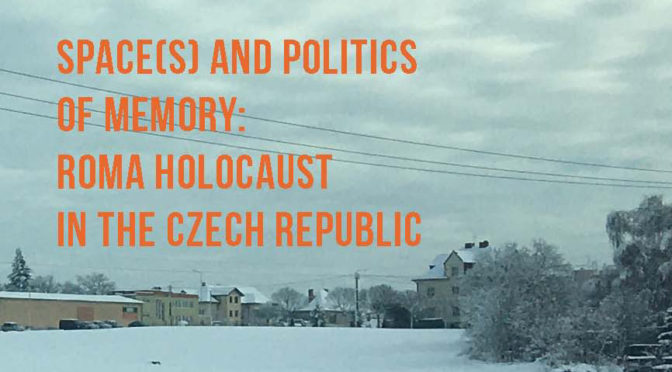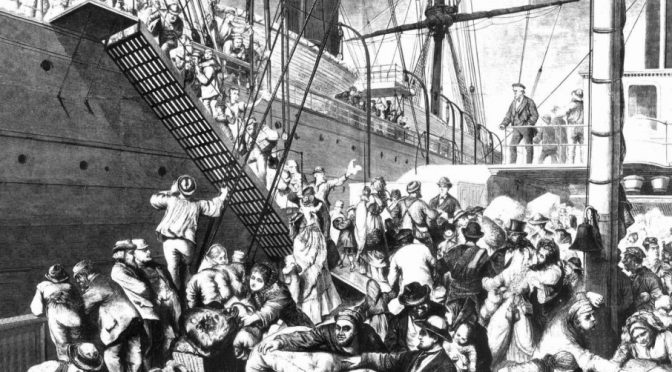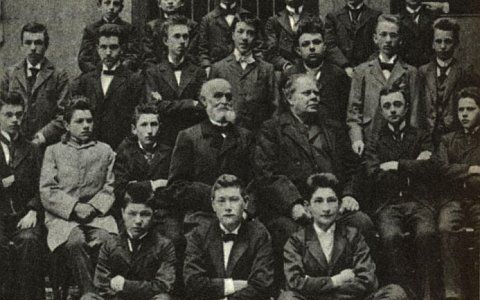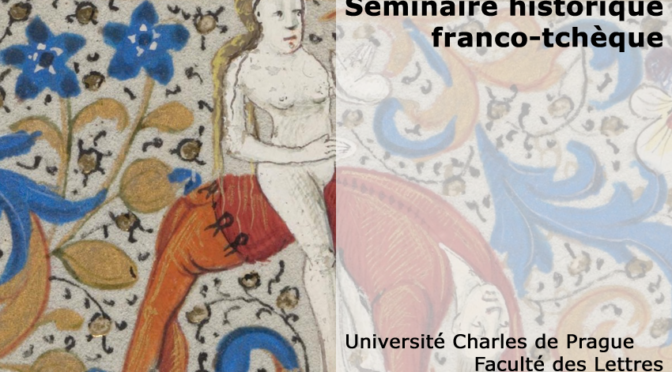
Prostor(y) a politika paměti:
Romský holokaust v České republice
Webinář Proteus
Datum: 10. prosince 2021 v 10:00 hod
Místo: Online na zoomu ID 450 714 1898 code 681515
https://upr-si.zoom.us/j/4507141898?pwd=MnVqYmZPTzZqbldYUEFHODRSbXlldz09
Jazyk: Angličtina
Přednášející:
Yasar ABU GHOSH, odborný asistent, Univerzita Karlova, Fakulta humanitních studií
Účastníci:
- Alenka JANKO SPREIZER, docent, Primorská univerzita, Fakulta humanitních studií
- Nikola LUDLOVÁ, doktorandka na Středoevropské univerzitě a v CEFRESu
Organizátoři:
- Petra KAVRECIC, odborný asistent, Primorská univerzita, Fakulta humanitních studií
- Felipe Kaiser FERNANDES, doktorand na IIAV EHESS, přidružený k CEFRESu & Univerzitě Karlově
Abstract
In anthropology, the relation of Roma to the past has been a central concern in conceptualizing Romani forms of attachment and belonging. These being enacted in the present, the past is seen as a “foreign country”. However, since 1980’s we have been witnessing a rising engagement of various European Roma and pro-Roma agents with struggles over the recognition of the memory of Holocaust and Romani victimhood. Be it in artistic expressions, in memoirs writings or in political participation, the shift towards historical framing signals a rather different attitude towards the past. The apparent contradiction has been highlighted in several contributions that sought to explain it by reference to new politics of identity, to ethnic emancipation and Europeanization, or by discerning the formation of a Romani elite as the bearer of an emerging political subjectivity.
In my presentation I will build on a dissection of a commemorative practice identified as name-reading, a practice that is constituted at the nexus of inclusive politics of commemoration and what is called the archival mode in Holocaust commemoration. Dissecting the practice should allow to raise questions that would connect a practice of commemoration with some of the cultural frames of memory identified by anthropologists of different Roma communities. I will be asking does name-reading serve what commemoration is supposed to do, that is actualize the past for the needs of the present?
Yasar Abu Ghosh is lecturer in sociocultural anthropology at the Department of Social and Cutlural Anthropology, Charles University, Prague and faculty member of NYU Prague. He specializes in topics related to Central European Roma, economic and political anthropology and ethnographic methodology. His latest research focuses on survival strategies of poor Roma in the Czech Republic, on politics of marginalization and the enduring effects of racialized regimes of state minority policies, as well as on the formation and logic of Romani subjectivity in response to processes of cultural dispossession. In 2016 he was a Fulbright scholar at the Department of Anthropology, University of California in Berkeley, he was also a visiting professor at CEU in Budapest, LMU in Munich, and at EHESS in Paris. Currently he is working on a monograph drawing on a history of participant observation of memory-becoming in relation to Roma and non-Roma struggle over the recognition of suffering and historic memory in Czechia.

The Transformations of the Book Publishing in Post-Socialist Spaces (ex-USSR, post-Yugoslav space, Czech Republic and Slovakia)
Workshop organizuje Research Center Europe-Eurasia, National Institute for Oriental Languages and Civilizations (INALCO), Paris, ve spolupráci s CEFRESem.
Datum: Středa 7. února 2024, 10:00–17:00
Místo: INALCO – Maison de la Recherche – Salle de Sacy – 2e étage (2, rue de Lille – Paris 7e)
Oraganizuje
- Anne Madelain (CREE, Inalco, Paris)
- Daria Petushkova (CREE, Inalco / CESSP, EHESS)
Účastníci
- Aglaé Achechova (BULAC, Paris),
- Dmitrii Khriakov (EHESS, Paris),
- Anne Madelain (CREE, Inalco, Paris),
- Vanda Mikšić, Mirna Sindičić Sabljo, Željka Tonković (Université de Zadar, Croatie),
- Bella Ostromooukhova (Eur’Orbem, Sorbonne Université, Paris),
- Daria Petushkova (CREE, Inalco et CESSP, EHESS),
- David Piovesan (Magellan, Université Jean Moulin Lyon 3),
- Jiřina Šmejkalová (Institute of Information Studies and Librarianship, Université Charles, Prague)
- Anna Štičková (Masaryk University, Brno, Rep. Tchèque)
Argument
“The end of the socialist regimes profoundly affected the publishing industry and book distribution in the post-socialist space, including Central and Southeast Europe. Among the most visible transformations that occurred, the end of state control, the appearance of private actors (publishers, distributors, booksellers) and the influx of translations of works by Western authors can be emphasized (as substantial). These transformations have also coincided with the digital revolution that has disrupted publishing and reading practices all over the world. The full-scale invasion of Ukraine in 2022 brought new pressure and reconfigurations.”
This workshop will bring together the authors of a multidisciplinary and comprehensive set of papers which will be published in the special issue of the open access peer-reviewed journal Connexe. Exploring Post-communist Spaces.
Contakt
anne.madelain@inalco.fr et daria.petushkova@inalco.fr
obraz: Knihkupectví Karolinum, Prague, 2019 © Anne Madelain

Prodané duše – Migrace z Německa do Ameriky a jiných částí Evropy (1648–1780)
Přednáška Williama O’Reillyho (Trinity Hall, University of Cambridge)
Čas a místo konání: CEFRES, zasedací místnost – Na Florenci 3, budova C, 3. patro, v 17:30
Jazyk: angličtina
Organizátorka: Veronika Čapská (FHS UK)

William O’Reilly je profesorem dějin raného novověku na University of Cambridge, náměstkem ředitele ústavu Centre for History and Economics a stálým vědeckým pracovníkem v Institute for Advanced Study (IEA) v Budapešti. Věnuje se mnoha tématům spojeným s evropským a atlantickým prostorem v raném novověku, zejména se zajímá o dějiny evropské migrace, kolonialismu a imperialismu. Je členem redakční rady časopisů Historical Journal a Themes in Migrations.
Résumé:
V Prodaných duších William O’Reilly zkoumá dějiny emigrace v 17. a 18. století z Německa do severní Ameriky a střední a východní Evropy za pomoci osob zvaných Seelenverkäufer. Tito „obchodníci s dušemi“ nabírali a doprovázeli migranty; byli převaděči mezi geografickými lokalitami, mezi gramotností a negramotností, mezi ekonomickou jistotou a nejistotou, mezi svobodou a otroctvím. Tak jako z Evropy odcházelo v důsledku vylidnění a otřesů způsobených třicetiletou válkou stále více migrantů, rostl také počet převaděčů. V Evropě 17. a 18. století bylo nemožné zvažovat emigraci bez pomoci prostředníka nebo agenta. Někdy šlo o padouchy, jindy i o dobrodince, avšak bez jejich úsilí by byla veškerá raně novověká migrace nemyslitelná. Právě oni stáli u zrodu pozdějších masových migrací v 19. a 20. století.
Přednáška bude pojednávat o úloze těchto převaděčů a osadníků při budování složité komunikační sítě, která pokrývala rozsáhlý atlantický prostor od Pensylvánie až po Transylvánii. Bez jejich přičinění by tehdy nebylo možné udržovat sít neformálních kontaktů, a další migrace by tudíž nebyla možná.

Přednášku v rámci semináře o soudobých dějinách Židů organizovaného Ústavem pro soudobé dějiny AV ČR ve spolupráci s Masarykovým ústavem přednese Enrico Lucca (Simon Dubnow Institut , Lipsko).
Kde: Na Florenci 3, 110 00 Praha1
Kdy: 17:00-18:30
Jazyk: angličtina
Abstrakt
Franz Kafka (1883-1924) a Hugo Bergman (1883-1975) se seznámili již ve školních lavicích a už od prvních let na universitě byli důvěrnými přáteli. Teprve na sklonku svého života začal Berman psát o Kafkovi a věnoval mu v různých časopisech několik esejí v němčině i hebrejštině. Enrico Lucca promluví o tomto vrtkavém přátelství a také o Bergmanově pohledu na Kafkova díla. Pokusí se také o výklad Kafky a Bergmanova duchovního vývoje.
Druhé setkání epistemologického semináře pořádáného CEFRESem a IMS FSV UK pod vedením Istvána Pála Ádáma (CEFRES).
Texty:
-
E. P. Thompson, « The Moral Economy of the English Crowd in the Eighteenth Century », Past & Present, No. 50, Oxford University Press, 1976, p 76-94
-
Ernesto Verdeja, “Moral Bystanders and Mass Violence,” dans New Directions in Genocide Research, Routledge, 2011






